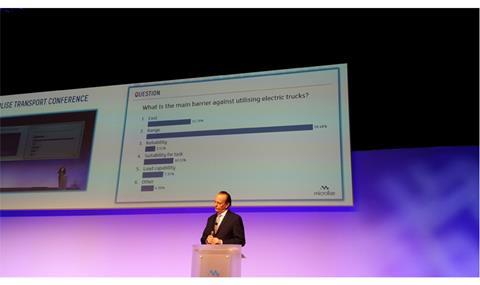
Another packed audience of 1,200 transport professionals assembled for the sixth annual Microlise Transport Conference at the Ricoh Arena in Coventry to hear a series of top class speakers outline the key challenges and opportunities facing the road transport industry.
Introducing the conference, journalist and FairFuelUK campaigner Quentin Willson said there was a danger that legislation would get ahead of the technology available to deliver zero emissions vehicles, leaving the transport industry “in limbo”.
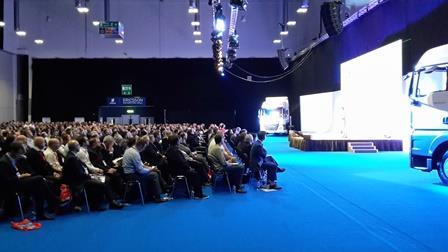
Venn Chesterton, innovation lead for ultra-low emissions vehicles at Innovate UK, gave an update on the low carbon truck trial and said that Euro-6 diesel trucks were very good on emissions and the next step would be zero emissions vehicles.
“There isn't much in between,” Chesterton said. But he qualified that by saying that in terms of CO2 reduction there were lots of other alternatives which could include hybrids and biogas and that “we should be trying other things”.
Addressing operators he advised “you need a plan in place so when in five years time things do change you are ready”.
Platooning
Platooning trucks is seen as a way of reducing fuel consumption and hence emissions by between 5% and 30% depending on road type and traffic conditions, and CEO of the TRL Rob Wallis gave an update on the government-funded platooning trial kicked off last year.
The two-year, £8m project is now well into its planning phase, with lead partners DHL and DAF developing the vehicles and training the drivers who will take part. Wallis was keen to stress that the UK trial will be a world-first as it will involve platoons driving on live motorways rather than on closed roads.
“This is not a technology demonstration,” he insisted. “They have already taken place around the world – we are aiming to find out if platooning is commercially viable, safe and acceptable to the public and industry. It has the potential to put the UK ahead in innovation.”
He also stressed that the trial was not about driverless trucks, and the radar and camera technology enabling the trucks to travel half a second apart should be seen as extra advanced driver aids rather than a step towards autonomous vehicles.
Leaving a driver in charge will avoid the thorny question of liability in the event of an accident – DHL's drivers will clearly be in the frame in the event of an incident.
https://www.youtube.com/watch?v=f89EoE-BGJU
Wallis said the trial would investigate the costs and benefits of platooning, including, reduced fuel consumption, lower vehicle maintenance, the impact on driver workload, traffic congestion, carriageway wear and road safety.
Possible locations for the trial include the M1, M6, M4 and M2 and it is expected vehicles will take to the road for four months from spring 2019, initially late at night when traffic is light. This phase will involve 140 journeys of 100 miles in platoons and the same runs again in non-platooning formation to enable usable comparisons.
There will then be an eight-month evaluation before the conclusions are published. “We want an objective measure of the fuel economies from three trucks running close together,” said Wallis.
“We estimate a fuel saving of 5% to 30% and platooning could improve traffic flow and road safety.” he said.
Vehicle simulators are being used to help train drivers and procedures being drawn up on what happens if something goes wrong during the trials. “We have to do it right – this is an unprecedented opportunity for the UK to take the lead in real-world operations,” he said.
Wallis conceded that there would be little benefit from platooning in heavy traffic as the aerodynamics only worked at consistent high speed running. But he dismissed suggestions that three trucks running nose to tail might cause problems for cars trying to join or leave motorways.
“Trucks already drive close together so having them half a second apart might actually make this more manageable,” he said.
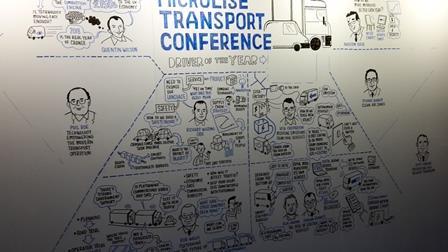
Despite doubts over cost, weight and range – and a number of past false starts - some operators are taking the bold step of investing in full electric light commercials in anticipation of a future ban on diesel and petrol vehicles in many towns and cities with severe air quality problems.
Royal Mail is working with EV start up Arrival to roll out electric delivery vans and Royal Mail head of fleet engineering Grahame Bennett said they had been very successful. Arrival is going to build 3.5- to 26-tonne 'smart' EVs designed from scratch at a 110,000 ft2 greenfield factory in Banbury.
Royal Mail took the first 6-tonne Arrival vans in December 2015 and importantly Bennett said the reaction from drivers was overwhelmingly positive from the outset. Given that Royal Mail employs 90,000 drivers for its fleet of 47,000 light commercials and 6,000 HGVs this was essential to the success of the project.
Bennett said another key factor was that the Arrival vehicle is simple to maintain and modular so that larger vehicles just had more of the same motors and the option of range-extending engine could be quickly swapped for more batteries just by undoing six bolts. “We use a 6-tonne vehicle and it has the same load capacity as a conventional 7.5-tonner as the Arrival is lighter,” he said. “Another key was that they matched the purchase price of a diesel van. In the past EV prices have been prohibitive.”
Ben Jardine, chief of product for heavyweight vehicles at Arrival, said the average daily mileage of the Royal Mail vehicles was just 35 and after specifying the first batch with range extenders the second set of vehicles would not have these fitted as range anxiety had been quelled. He said the current running costs were 16p per mile but this was coming down as improvements to the vehicles and their power management software were made.
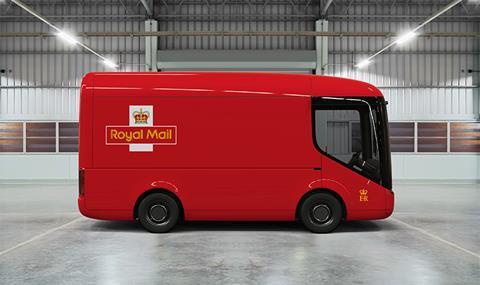
He said that Arrival was now working with Royal Mail on a vehicle suitable for motorway operation and that by adding more modular battery packs a full electric vehicle could achieve a range of up to 250 miles. This could be extended even further with technology better than the current lithium ion batteries. “We are developing our own solid state batteries – that is the future,” he said.
When asked about the economic life of current batteries he said no one yet knew but that units fitted to buses 12 years ago “had shown no notable degradation”.
While much of the discussion at the conference centred on the impending death of the internal combustion engine, RHA CEO Richard Burnett urged operators to fight for the right to continue to use their diesel trucks.
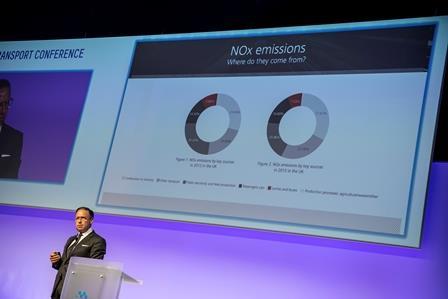
He pointed out that after three humiliating defeats in the courts the government was directing 33 local authorities with air quality that breaches EU and World Health Organization (WHO) limits to introduce clean air zones to tackle pollution from vehicles. But the RHA has estimated that only 7.6% of NOx emissions in 2015 came from trucks and buses and HGV emissions have already fallen by 43% since 2013.
He said the government must avoid “kneejerk reactions” to the court rulings that would unfairly penalise hauliers by forcing them into the early adoption of Euro-6 technology. “There is a risk that the 33 local authorities will come up with plans very quickly and there will be poor policy decisions as a result,” he warned. “The government must support not penalise the transport industry.”
Burnett pointed that 85% of HGV operators were small to medium enterprises (SMEs) and that they are caught between the rock of charges to enter low emission or clean air zones and the hard place of stumping up £80,000 to £100,000 for a new Euro-6 truck.
“For an SME that is a real challenge,” he said. “The secondhand [Euro-5 and earlier] market has collapsed because of the demonisation of diesel.”
He repeated the RHA's call for a scrappage scheme to help fund the “eye-watering affordability gap” between used trucks and new Euro-6 vehicles and called for more time and a “phased approach” to enable operators to plan ahead. “There should be no ban on vehicles less than 12 years old,” he said. “Euro-5 or older trucks will have to pay £100 a day to enter the London Ultra Low Emission Zone from 2019. For an SME haulier making £60 a week profit that means stop servicing London or go out of business.”
Burnett urged operators to push back and lobby their local MPs over the issue so they would put pressure on ministers to row back on their current plans. “We all want clean air but not at any cost,” he said. “We need a balanced approach.”
A more balanced approach to powering commercial vehicles was exactly what DHL Supply Chain has come up. Launching a thin, robust and flexible photo voltaic material suitable for fitting to the roofs of trucks, trailers and even scooters, DHL Supply Chain MD of transport, engineering and chemicals Phil Roe said the technology could “revolutionise” transport.
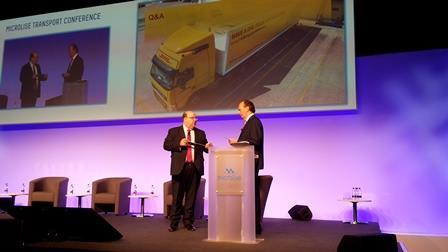
Developed in association with Don-Bur, the 2mm thick solar panel mats were found in a six month trial on 15 rigids and six trailers to cut fuel usage by 2% to 4% for artics and between 4% and 8% for rigid trucks. “We will launch it to the open market ,” said Roe. “The payback is excellent – less than one year.”
The earlier Innovation Workshop had heard from Shaun Stephenson, director of engineering at Ryder, about the truck rental giant's experiments in the US with electric vehicles. "Our goal is zero emissions by 2040," he said. "That is a challenge but what an opportunity." Ryder's plan is to have up to 50% of its medium trucks and 35% of its heavy tractors using electric power within 10 years.
In the US, Ryder is already trialling the Chanje, Workhorse and Nikola electric or range extended vehicles, and is among the first companies to order the electric Tesla Semi. "We will take the learning from the US before bringing these to the UK," Stephenson said. "Ryder is driving these changes and is working with customers to deliver these opportunities."
Throughout the event, the audience was asked to vote on key questions, providing a fascinating snap shot of opinions within the transport industry ('don't knows' have been omitted).
Is the government legislation unfair on the transport industry?
Yes 74%
No 26%
Is running a transport operation harder than it was 12 months ago?
Worse 42%
Same 42%
Better 14%
Will you trial alternative fuelled vehicles as they come to market?
Yes 78%
No 22%
Which alternative fuels do you expect to be using in 10 years?
Electric 16%
Hybrid 40%
Gas 18%
Hydrogen 19%
Will platooning be a reality on UK roads in 10 years?
Yes 51%
No 49%
Is the transport industry considered in the development of clean air and low emission zones?
Yes 9%
No 50%
To a degree 42%
Are you concerned that air quality measures will have a negative financial impact on your business?
Yes 85%
No 15%
What percentage of your fleet will be diesel powered by 2015?
0-25% 10%
26-50% 25%
51-75% 34%
76-100% 31%

[]For more detail on the voting results see the Microlise supplement in MT's June 14 issue.










